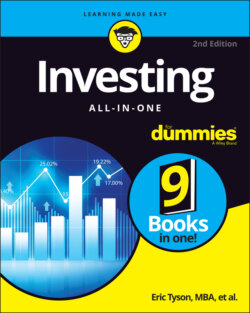Читать книгу Investing All-in-One For Dummies - Eric Tyson - Страница 81
Devising tax-reduction strategies
ОглавлениеUse these strategies to reduce the taxes you pay on investments that are exposed to taxation:
Make use of retirement accounts and health savings accounts. Most contributions to retirement accounts gain you an immediate tax break, and once they’re inside the account, investment returns are sheltered from taxation, generally until withdrawal. Think of these as tax reduction accounts that can help you work toward achieving financial independence. See Chapter 1 in Book 2 for details on using retirement accounts when investing.Similar to retirement accounts are health savings accounts (HSAs). With HSAs, you get a tax break on your contributions up-front; investment earnings compound without taxation over time; and there’s no tax on withdrawal so long as the money is used to pay for health-related expenses (which enjoy a fairly broad list as delineated by the IRS).
Consider tax-free money market funds and tax-free bond funds. Tax-free investments yield less than comparable investments that produce taxable earnings, but because of the tax differences, the earnings from tax-free investments can end up being greater than what taxable investments leave you with. If you’re in a high-enough tax bracket, you may find that you come out ahead with tax-free investments. For a proper comparison, subtract what you’ll pay in federal and state income taxes from the taxable investment income to see which investment nets you more.
Invest in tax-friendly stock funds. Mutual funds and exchange-traded funds that tend to trade less tend to produce lower capital gains distributions. For funds held outside tax-sheltered retirement accounts, this reduced trading effectively increases an investor’s total rate of return. Index funds invest in a relatively static portfolio of securities, such as stocks and bonds. They don’t attempt to beat the market; rather, they invest in the securities to mirror or match the performance of an underlying index. Although index funds can’t beat the market, the typical actively managed fund usually doesn’t, either, and index funds have several advantages over actively managed funds.
Invest in small business and real estate. The growth in value of business and real estate assets isn’t taxed until you sell the asset. Even then, with investment real estate (see Book 8), you often can roll over the gain into another property as long as you comply with tax laws. Increases in value in small businesses can qualify for the more favorable longer-term capital gains tax rate and potentially for other tax breaks. However, the current income that small business and real estate assets produce is taxed as ordinary income.
Short-term capital gains (investments held one year or less) are taxed at your ordinary income tax rate. This fact is another reason why you shouldn’t trade your investments quickly (within 12 months).
